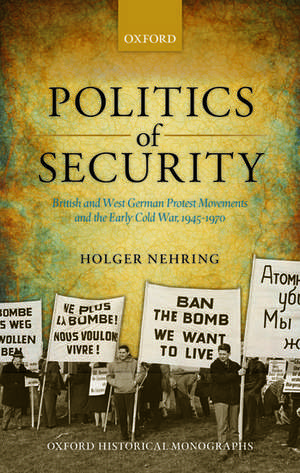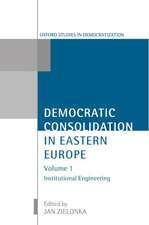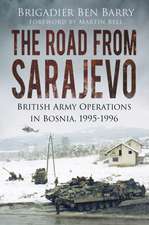Politics of Security: British and West German Protest Movements and the Early Cold War, 1945-1970: Oxford Historical Monographs
Autor Holger Nehringen Limba Engleză Hardback – 24 oct 2013
Din seria Oxford Historical Monographs
- 19%
 Preț: 497.26 lei
Preț: 497.26 lei - 12%
 Preț: 310.34 lei
Preț: 310.34 lei - 30%
 Preț: 539.99 lei
Preț: 539.99 lei - 15%
 Preț: 244.01 lei
Preț: 244.01 lei - 13%
 Preț: 532.53 lei
Preț: 532.53 lei - 30%
 Preț: 499.46 lei
Preț: 499.46 lei - 30%
 Preț: 497.67 lei
Preț: 497.67 lei - 30%
 Preț: 499.46 lei
Preț: 499.46 lei - 30%
 Preț: 498.68 lei
Preț: 498.68 lei - 30%
 Preț: 604.98 lei
Preț: 604.98 lei - 30%
 Preț: 497.63 lei
Preț: 497.63 lei - 24%
 Preț: 496.31 lei
Preț: 496.31 lei - 30%
 Preț: 498.68 lei
Preț: 498.68 lei - 22%
 Preț: 497.81 lei
Preț: 497.81 lei - 25%
 Preț: 556.27 lei
Preț: 556.27 lei - 14%
 Preț: 539.57 lei
Preț: 539.57 lei - 30%
 Preț: 500.29 lei
Preț: 500.29 lei - 13%
 Preț: 533.57 lei
Preț: 533.57 lei - 25%
 Preț: 569.72 lei
Preț: 569.72 lei - 30%
 Preț: 610.82 lei
Preț: 610.82 lei - 34%
 Preț: 1153.34 lei
Preț: 1153.34 lei - 51%
 Preț: 614.88 lei
Preț: 614.88 lei - 34%
 Preț: 1195.31 lei
Preț: 1195.31 lei - 34%
 Preț: 1035.84 lei
Preț: 1035.84 lei - 34%
 Preț: 1006.40 lei
Preț: 1006.40 lei - 29%
 Preț: 864.39 lei
Preț: 864.39 lei - 34%
 Preț: 1160.09 lei
Preț: 1160.09 lei - 34%
 Preț: 1432.67 lei
Preț: 1432.67 lei - 31%
 Preț: 328.46 lei
Preț: 328.46 lei - 34%
 Preț: 574.40 lei
Preț: 574.40 lei - 34%
 Preț: 1067.93 lei
Preț: 1067.93 lei - 34%
 Preț: 1004.67 lei
Preț: 1004.67 lei - 31%
 Preț: 331.22 lei
Preț: 331.22 lei - 34%
 Preț: 1153.28 lei
Preț: 1153.28 lei - 34%
 Preț: 1254.66 lei
Preț: 1254.66 lei - 34%
 Preț: 946.79 lei
Preț: 946.79 lei - 34%
 Preț: 962.63 lei
Preț: 962.63 lei - 34%
 Preț: 1126.38 lei
Preț: 1126.38 lei - 31%
 Preț: 469.27 lei
Preț: 469.27 lei - 23%
 Preț: 332.04 lei
Preț: 332.04 lei - 28%
 Preț: 375.23 lei
Preț: 375.23 lei - 34%
 Preț: 1049.14 lei
Preț: 1049.14 lei - 34%
 Preț: 1036.73 lei
Preț: 1036.73 lei - 51%
 Preț: 757.67 lei
Preț: 757.67 lei - 34%
 Preț: 1082.61 lei
Preț: 1082.61 lei - 34%
 Preț: 1155.39 lei
Preț: 1155.39 lei - 31%
 Preț: 328.53 lei
Preț: 328.53 lei - 34%
 Preț: 1110.12 lei
Preț: 1110.12 lei - 31%
 Preț: 487.75 lei
Preț: 487.75 lei - 34%
 Preț: 1153.41 lei
Preț: 1153.41 lei
Preț: 804.25 lei
Preț vechi: 1156.04 lei
-30% Nou
Puncte Express: 1206
Preț estimativ în valută:
153.89€ • 160.69$ • 127.08£
153.89€ • 160.69$ • 127.08£
Carte tipărită la comandă
Livrare economică 04-10 aprilie
Preluare comenzi: 021 569.72.76
Specificații
ISBN-13: 9780199681228
ISBN-10: 0199681228
Pagini: 358
Ilustrații: 6 black and white images
Dimensiuni: 144 x 220 x 28 mm
Greutate: 0.59 kg
Editura: OUP OXFORD
Colecția OUP Oxford
Seria Oxford Historical Monographs
Locul publicării:Oxford, United Kingdom
ISBN-10: 0199681228
Pagini: 358
Ilustrații: 6 black and white images
Dimensiuni: 144 x 220 x 28 mm
Greutate: 0.59 kg
Editura: OUP OXFORD
Colecția OUP Oxford
Seria Oxford Historical Monographs
Locul publicării:Oxford, United Kingdom
Recenzii
A sophisticated comparative history of the anti-nuclear movement in its founding British heartland and on World War III's most likely atomic battlefield, West Germany. Nehring's book is both provocative and evocative, offering a compelling mix of intellectual and social history which brings alive the Cold War in its most dangerous decades.
a valuable and important study, one that makes great strides towards challenging the 'left-versus-right' dynamic that sits at the heart of so many studies of post-war protest, and particularly those that focus on the 1960s. The book will be of particular interest to those researching protest in a transnational perspective - which, as Nehring demonstrates, was as much about concrete exchange and experience as it was about 'imagined communities' of solidarity.
a ground-breaking study on the transnational history of two peace movements in the early phase of the Cold War.
a valuable and important study, one that makes great strides towards challenging the 'left-versus-right' dynamic that sits at the heart of so many studies of post-war protest, and particularly those that focus on the 1960s. The book will be of particular interest to those researching protest in a transnational perspective - which, as Nehring demonstrates, was as much about concrete exchange and experience as it was about 'imagined communities' of solidarity.
a ground-breaking study on the transnational history of two peace movements in the early phase of the Cold War.
Notă biografică
Holger Nehring completed his D.Phil. at University College, Oxford, before taking up a research fellowship at St. Peter's College, Oxford. He has been teaching at the University of Sheffield since March 2006. His interests lie in the transnational history of social movements and activism, peace history, the history of violence, and the history of the Cold War. He is one of the co-founders of the Centre for Peace History at Sheffield, one of the very few institutions in the world that specialises in research on and teaching of the historical contingencies of peace making and peace keeping.










